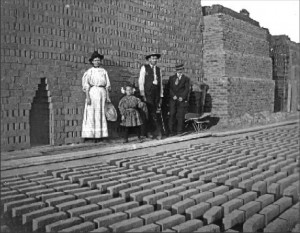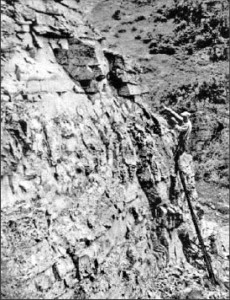by Hal Walter
Late summer has its many emotions here in the Wet Mountains, from the blustery days when you first notice the edges of the aspens turning, to the clear blue days that seem never to end as summer becomes fall. But I know in my bones these days will end.
At some point the summer bugs will come off the windshield with the first heavy frost.
The leaves will fall, and generally some whopper of a snowstorm will bring it all crashing down sometime around Halloween.
Recently, on one of those blustery days, I hauled two horses from the ranch I caretake out to Mission Wolf, where they will fulfill their final missions in the circle of life. Star was chronically lame from an old injury (shattered coffin bone) and painfully blind in one eye. Ciao was elderly; his body was bumpy with tumors from head to tail, and recent winters have been tough on this kind old soul. While it was Star who caused me more emotional turmoil by not loading easily, it was particularly painful for me to load Ciao for this journey.
For several winters now Ciao has been surviving on a heavy ration of senior horse feed, plus whatever hay he would eat. He had to be separated from the other horses to keep them from stealing it and because on the colder days it would take him a great deal of time to consume this ration of molasses-soaked pellets. While this worked wonders as far as his weight was concerned, I am not convinced the heavy dose of synthetic vitamins, sugar and cheap polyunsaturated oils contained in these feeds did not contribute to the growth of tumors. This form of equine life support might just be a two-edged sword.
Since my son Harrison began to walk — and even before he had been diagnosed with autism — I have been especially vigilant about his being around livestock. His general lack of a sense of danger flat out scares me sometimes, and so I have done my best to stay within sprinting distance and to keep him out of the horse corrals. However, Harrison is very quick and one day while I was wrestling with a frozen water hose he bolted and slipped into Ciao’s pen while the horse was eating his senior feed. I’ll always be thankful to that old horse for standing there calmly, chewing, and not reacting violently to the small boy standing at his feet, beneath the bucket, playing with the gate.
Einstein said that time is relative, and so it stands to reason distance may be as well. It’s an 80-mile round trip, give or take a few million miles, from here to the wolf sanctuary, much of it on bad road. Part of the journey passes through an odd development where people have put up everything from makeshift sheds and camper trailers to beautiful hand-hewn log homes. One place in particular stood out — a beat-up modular with a type of landscaping that suggests the occupants don’t waste any time or money on garbage pick-up or trips to the dump. In the middle of this starter landfill stood two horses eating out of a feeder.
The landscape of the western flanks of the southern Wet Mountains has a unique feel to it, with rolling hills of tawny grass and clumps of stunted aspens. It’s backdropped by a spectacular view of the southern Sangre de Cristos, from Tijeras Peak to Mount Lindsey. With these jagged peaks shredding the dark gray clouds the scene was fittingly melancholy.
The folks at the wolf sanctuary were very gracious and helpful in unloading. I learned that they were feeding the wolves at a rate of two horses per week. As much as I favor the idea of these animals not going to waste, it was still one of the most difficult tasks I have ever undertaken. But dead is dead, and the wolves need to eat too. This notion was not supported by the rusty center gate in the trailer, which had somehow become firmly lodged shut during the trip and had to be pried open with fencing pliers.
Before I drove away I was caught off-guard by a receipt made out to the ranch for a sizable charitable donation.
It was perhaps a mistake to glance back from the ridge overlooking the wolf sanctuary as the empty trailer rattled up the washboarded Ophir Creek Road. I could see the small figures of Star and Ciao grazing peacefully with two other horses awaiting their fates, and the scene cast a pall over the next couple days especially with the weather turning gloomy.
Thomas McGuane wrote in in his fine collection of essays called “Some Horses” that it’s not the horse’s duty to be a “biofeedback mechanism for yearning humans.” While this is right up there with Einstein in my book, I would extend this idea to include burros and dogs. But let’s just forego this sort of philosophizing and mincing of words. The bottom line: I took care of those horses for several years and it was really damn hard to leave them out there.
A couple days later, some levity. I had received a call the previous evening from Dave over at Bear Basin Ranch, the local dude outfit. Three of their cattle have been mixed in with ours for some time. Dave had a Cowboy Weekend group coming in and needed to retrieve his three beasts for their activities.
I went over to the pasture with one of my saddle donkeys, Ace, and found all the cattle — our nine head and their three — in some thick brush and timber. It wasn’t much work to get the herd moving, and Ace kept them pinned against a fence and calmly trailed them all the way across the school section to the corral.
I heard some voices off in the trees, and soon Justin, one of the Bear Basin wranglers, showed up on his horse. Pretty quickly the two of us had the three white-faced Bear Basin cattle sorted and penned in a corral. Meanwhile, the rest of the cattle meandered on up the hill.
Dave and the rest of the group showed up shortly and we devised a plan to get the three beeves on their way back to Bear Basin. All these cowboys had to do was block about 100 feet of an opening to the corral so the cattle would move out the gate and onto the road.
But it didn’t work that way.
I watched as Justin let the cattle out of the pen. Two of them started to go the way we planned, but the third decided to break away and go with the herd, resulting in a minor rodeo. The last thing I saw Dave and Justin were chasing the three renegades up the hill and trying to haze them back toward the corral.
As I rode off on Ace I joked with a couple of the dudes about how one guy on a donkey rounded up the whole herd, but it took eight guys on horseback to let three of them get away. “We can tell who the locals are,” one them quipped back.
I understand that the decision eventually was made to bring the entire herd of cattle back in to re-sort the Bear Basin beeves.
Here in the high country, life does indeed go on.
Hal Walter writes and edits from the Wet Mountains. You can keep up with him regularly at his blog: www.hardscrabbletimes.com

